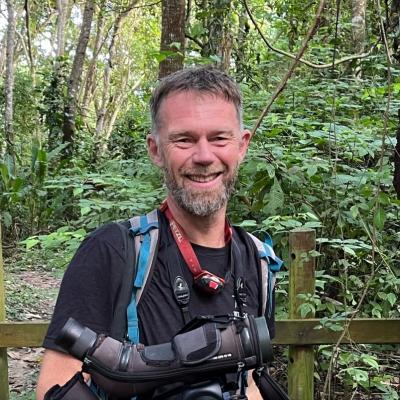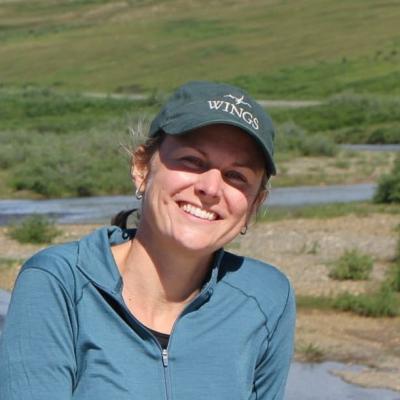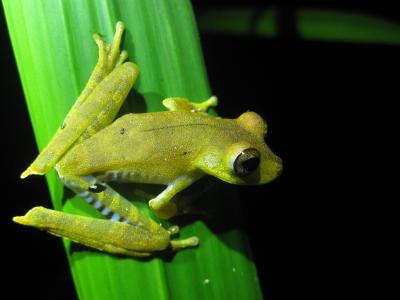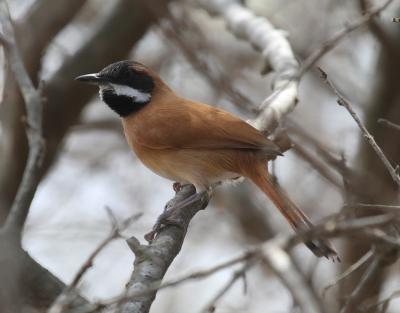Colombia: The West
Montezuma Road and Valle del Cauca
-
Jul 11-20, 2025
Fabrice Schmitt
-
Jul 18-27, 2026
Fabrice Schmitt
2025
Single Occupancy Supplement $450
2026
Tour Price to be Determined
2025
Single Occupancy Supplement $450
2026
Tour Price to be Determined
Colombia’s Western Cordillera or ‘cordillera occidental’, isolated by the Pacific to the West and the dry Cauca Valley to the East, is one of the highest centers of endemism in the world. On our new tour, we can expect to see an amazing number of unique birds endemic to this range, including Velvet-purple Coronet, Rufous-gaped Hillstar, Toucan Barbet, Five-colored Barbet, Tatama Tapaculo, Tricolored (Chocó) Brushfinch, Glistening-green Tanager, Black-and-gold Tanager and Chestnut-bellied Flowerpiercer.
The Montezuma Road is one of the best birding locations in Colombia with more than 500 species recorded. Birding here, surrounded by pristine cloud forest all the way up to 8,500 feet, is an unforgettable experience with mixed-species flocks often containing more than 20 bird species. We’ll also visit numerous feeder stations attracting stunning birds such as Empress Brilliant, Purple-throated Woodstar, Violet-tailed Sylph, and Green Thorntail as well as Red-headed Barbet, Colombian Chachalaca, Toucan Barbet, the amazing Multicolored Tanager, and so many more. Paradise for birdwatchers and photographers!
Along our route from Pereira to Cali, we’ll stay at just three hotels, including four nights at the very comfortable Araucana Lodge. A relaxing afternoon at the lodge, enjoying a cup of Colombian coffee (or a tropical fruit juice, or a beer!) is always an option.
Along with the overwhelming avian diversity here, the assortment of plants, crickets, butterflies, orchids, and frogs is absolutely incredible and we’ll see some wonderful creatures. This tour can be taken back-to-back with our Colombia: Central tour, which debuted successfully in 2024.
Colombia’s Western Cordillera or ‘cordillera occidental’, isolated by the Pacific to the West and the dry Cauca Valley to the East, is one of the highest centers of endemism in the world. On our new tour, we can expect to see an amazing number of unique birds endemic to this range, including Velvet-purple Coronet, Rufous-gaped Hillstar, Toucan Barbet, Five-colored Barbet, Tatama Tapaculo, Tricolored (Chocó) Brushfinch, Glistening-green Tanager, Black-and-gold Tanager and Chestnut-bellied Flowerpiercer.
The Montezuma Road is one of the best birding locations in Colombia with more than 500 species recorded. Birding here, surrounded by pristine cloud forest all the way up to 8,500 feet, is an unforgettable experience with mixed-species flocks often containing more than 20 bird species. We’ll also visit numerous feeder stations attracting stunning birds such as Empress Brilliant, Purple-throated Woodstar, Violet-tailed Sylph, and Green Thorntail as well as Red-headed Barbet, Colombian Chachalaca, Toucan Barbet, the amazing Multicolored Tanager, and so many more. Paradise for birdwatchers and photographers!
Along our route from Pereira to Cali, we’ll stay at just three hotels, including four nights at the very comfortable Araucana Lodge. A relaxing afternoon at the lodge, enjoying a cup of Colombian coffee (or a tropical fruit juice, or a beer!) is always an option.
Along with the overwhelming avian diversity here, the assortment of plants, crickets, butterflies, orchids, and frogs is absolutely incredible and we’ll see some wonderful creatures. This tour can be taken back-to-back with our Colombia: Central tour, which debuted successfully in 2024.
Day 1: You’ll be met on arrival in Pereira and transferred to our hotel where the tour begins this evening. Night in Pereira.
Day 2: This morning we’ll transfer to our countryside lodge, perfectly located at the base of Montezuma peak, arriving in time for lunch. We’ll have the afternoon to bird the gardens and surroundings, and enjoy the lodge feeders which attract such stunning hummingbirds as Empress Brilliant, Rufous-gaped Hillstar and Purple-throated Woodstar. Night at Montezuma Ecolodge.
Day 3-4: Located in the Western Cordillera, Tatama National Park protects an extensive and almost inaccessible pristine forest. The landscape, dominated by Tatama Peak, is magnificent and the list of endemics and restricted species from this site is phenomenal. We’ll have two entire days to bird the national park along the Montezuma Road. On the upper part of the road, we’ll look for Chestnut-bellied Flowerpiercer and the attractive Gold-ringed Tanager, known from only a very few places in Colombia’s Western Andes, as well as Toucan Barbet, Rufous Spinetail, Handsome Flycatcher, and Dusky Chlorospingus. Along the lower part of the road we hope to find Broad-billed Motmot, Red-faced Spinetail, Uniform Treehunter, Yellow-breasted Antwren, Zeledon’s Antbird, Chestnut-crowned Gnateater, the recently described Tatama Tapaculo, and the fancy Orange-breasted Fruiteater. Here mixed-species flocks can include Black-chinned Mountain-tanager, Golden-collared Honeycreeper, Flame-faced and Silver-throated Tanagers, and the stunning Chestnut-breasted and Yellow-collared Chlorophonias. Nights at Montezuma Ecolodge.
Day 5: We’ll have a full morning birding along the lowest part of the Montezuma Road, looking for species we may have missed during our previous days here. After lunch, we’ll set off for the Cauca Valley and the city of Buga for a one-night stay. Night in Buga.
Day 6: We’ll have a full morning at Sonso Lagoon, where we’ll scan for waterbirds as well as open-country birds, possibly including a few Horned Screamers (there’s a very isolated population here) as well as Black-bellied and Fulvous Whistling-Ducks, Snail Kite, Limpkin, Wattled Jacana, Gray-cowled Wood-Rail, Striped and Dwarf Cuckoos, Jet Antbird, Bar-crested Antshrike, Pale-breasted Spinetail, Pied Water-Tyrant, the Colombian endemic Apical Flycatcher, and the tiny and cute Slate-headed Tody-Flycatcher. After lunch, we’ll continue onward to the very comfortable and birdy Araucana Lodge, our home for the next four nights. Upon arrival, we’ll spend the rest of the afternoon enjoying the feeders in the lodge gardens. Night at Araucana lodge.
Days 7–9: Three full days are needed to explore the Western Cordillera near Cali, as new birding trails and feeder stations open almost every year around here! We’ll use the best birding lodge in Colombia as our base for exploring the area, visiting different locations each day.
We’ll spend a full morning at the famous Doña Dora Garden on the famous Anchicaya road. No less than 300 species have been seen along this upper part of the road, so expect a wonderful morning! We’ll be looking for White-whiskered Hermit, Green Thorntail and Purple-bibbed Whitetip amongst the many hummingbirds visiting the feeders. The Toucan Barbet is a superstar here, and rarely leaves the garden! Ornate Flycatcher, Slaty-capped Shrike-Vireo, Bay Wren, Black-headed Brushfinch, Tricolored (Chocó) Brushfinch, Black-chinned Mountain-Tanager, Rufous-throated Tanager and Black-winged Saltator are just a few of the many species we hope to encounter during our time here.
We’ll also have a full day at much lower elevation, around 100m (350 feet). To reach San Cipriano Natural Reserve, we’ll need to leave our lodge early and then take a memorable half-hour ride on ‘brujitas’ (an artisanal ‘train’ pulled by a motorbike!). But we’ll rewarded by plenty of new birds which are mostly found at these lower elevations: Berlepsch’s Tinamou, Dusky Pigeon, Pallid Dove, Blue-chested Hummingbird and with luck the unique Tooth-billed Hummingbird, Black-breasted Puffbird, Five-colored Barbet, Choco Toucan and Black-cheeked Woodpecker, Chestnut-backed, Stub-tailed and Zeledon’s Antbirds, Purple-throated Fruitcrow, Black-capped Pygmy-Tyrant, Tawny-chested, Blue-whiskered and Scarlet-browed Tanagers, and Scarlet-thighed Dacnis are all possible here.
We’ll be sure to visit at least one of the famous feeder stations near Km 18, starring the well-named Multicolored Tanager coming to the fruits! But all tanagers are beautiful, and we should also see Golden-naped, Black-capped, Scrub, Saffron-crowned, Flame-rumped and Golden Tanagers at the feeders, as well as fantastic hummingbirds including Tawny-bellied Hermit, Speckled Hummingbird, Long-tailed Sylph, Greenish Puffleg, White-booted Racket-tail and Western Emerald. We can relax at our lodge, enjoying the garden feeders, but as you will see, time flies when birding the Western cordillera! Nights at Araucana Lodge.
Day 10: We’ll have a final morning to bird around the lovely Araucana Lodge, looking for a few more species we may have missed, or better looks or photos of others. We’ll be back at the lodge by mid-morning to pack up, and after lunch we’ll transfer to the Cali airport where the tour concludes.
Note: The information presented below has been extracted from our formal General Information for this tour. It covers topics we feel potential registrants may wish to consider before booking space. The complete General Information for this tour will be sent to all tour registrants and of course supplemental information, if needed, is available from the WINGS office.
ENTERING COLOMBIA: US citizens must have a passport, valid for at least six months after your date of departure from Colombia. A the present time, no visa is required for US citizens visiting Colombia for 90 days or less.
Visitors from other countries may need a visa; please contact your nearest Colombian embassy or consulate for further information.
COUNTRY INFORMATION: You can review the U.S. Department of State Country Specific Travel Information at https://travel.state.gov/content/travel/en/international-travel/International-Travel-Country-Information-Pages/Colombia.html and the CIA World Factbook background notes on Colombia at https://www.cia.gov/the-world-factbook/countries/colombia/.
PACE OF TOUR: The aim of this trip is to enjoy Colombia’s incredible biodiversity at the most relaxed pace possible. Of course, as on any birding tour, expect early starts and sometimes long drives, but we will also enjoy quiet and prolonged time at feeders! The pace of our tour will be set to the rhythm of the tropical birds, which means we’ll be out in the field as soon as the sun rises. Most of our days will begin between 5:00 and 6:00 a.m. The day we are visiting San Cipriano, we’ll have to leave our lodge at 4 a.m. as we have a good 1h30 drive plus 30 min on the ‘brujitas’ to reach San Cipriano. Some breakfasts will be taken in the field, others will be eaten at our hotels and lodges. On some days we will take a picnic lunch in the field and on others we will stop at roadside restaurants. Participants should be able to walk at a slow to moderate pace for four or five hours at a time; we may walk in the sun on some roads, though most of our trails will be in the shade. Most of our walking is along roads, and there’s generally no major change in altitude. When we’re in the mountains, we always try to walk downhill. Our vehicle will almost always follow the group at a distance, and so it’s possible to return to the vehicle for a rest if necessary. Sturdy shoes or boots are necessary and a walking stick may be helpful at times. Be aware that on most days you will not be able to return to the lodge on your own should you become tired.
Because the forests of the Colombian Andes are highly fragmented and only a few scattered sites remain accessible, there will be a few long drives between birding localities. We usually drive 3-4 hours between two birding sites, but drive could be as long as 6 hours from Montezuma to Cali. Traffic in Colombia can also be very hazardous, and at any moment traffic jams, roadworks or demonstrations can delay our movements. We will spend most of our time in mountain areas, and people can be subject to motion sickness on these mountain roads. The long drives will be broken up by restroom breaks and lunch stops. The group will typically return to our lodgings around 5:00 p.m., with dinner generally starting around 6:30. On most days there will be a break of at least one hour between getting back and meeting up for dinner. The leader will call a list of the birds recorded during the day either just before or just after dinner.
HEALTH: The Centers for Disease Control and Prevention (CDC) recommends that all travelers be up to date on routine vaccinations. These include measles-mumps-rubella (MMR) vaccine, diphtheria-tetanus-pertussis vaccine, varicella (chickenpox) vaccine, polio vaccine, and your yearly flu shot.
They further recommend that most travelers have protection against Hepatitis A and Typhoid.
Please contacting your doctor well in advance of your tour’s departure as some medications must be initiated weeks before the period of possible exposure.
The most current information about travelers’ health recommendations can be found on the CDC’s Travel Health website at https://wwwnc.cdc.gov/travel/destinations/traveler/none/colombia
Smoking: Smoking or vaping is prohibited in the vehicles or when the group is gathered for meals, checklists, etc. If you are sharing a room with a nonsmoker, please do not smoke in the room. If you smoke in the field, do so well away and downwind from the group. If any location where the group is gathered has a stricter policy than the WINGS policy, that stricter policy will prevail.
CLIMATE: The average daytime temperature during most of the tour will be around 80°F/25°C, but up to 90°F/30°C when we will be in the lowlands (San Cipriano mostly, but also Sonso lake). Our highest birding location is the upper part of the Montezuma Road at 8,000 feet, where fog and rain are possible at any time of year and where the temperature especially in the morning is always cool to cold, down to 54-60°F/12-15°C. We are doing our tour during the dry season, but heavy rain is possible any time.
ACCOMMODATION: All of our lodges have electricity and all have hot water.
In Pereira, we stay in comfortable and modern hotel. Montezuma EcoLodge is simple but is the best option near this wonderful birding area and has amazing feeders just a few steps from your room. Hotel Guadalajara in Buga is a comfortable countryside hotel. Araucana Lodge is one of the best lodges in Colombia and we’ll be happy to use it as a base camp for four nights! Outside of the cities, many of our accommodations are in very birdy settings, and some exciting birding can be had right from the balconies. Some of the hotels we visit on this tour have swimming pools, so guests may wish to come suitably prepared.
FOOD: Colombian Cuisine is very diverse and varies depending on the different regions of Colombia. In some areas you will find specialties like roasted ants or guinea pigs while in other areas Colombians wouldn’t even touch those dishes. Colombia is not a paradise for vegetarians as the Colombian diet includes a lot of meat. The offer of fresh fruit is overwhelming and many of the varieties you have probably never heard of before. In general breakfast is quite important in Colombia and consists of fruit juice, coffee or hot chocolate, fruit, eggs and bread.
WINGS tours are all-inclusive and no refunds can be issued for any tour meals participants choose to skip.
Food Allergies / Requirements: We cannot guarantee that all food allergies can be accommodated at every destination. Participants with significant food allergies or special dietary requirements should bring appropriate foods with them for those times when their needs cannot be met. Announced meal times are always approximate depending on how the day unfolds. Participants who need to eat according to a fixed schedule should bring supplemental food. Please contact the WINGS office if you have any questions.
TRANSPORTATION: Travel will mostly be by minibus, with 4WD jeeps used to bird along the Montezuma Road, where the road is in extremely bad shape. The ride above Montezuma lodge is rough and uncomfortable; the longest drive on that road will be about 2 hours. The road is in such a poor condition that people with serious back issues might reconsider making the trip, or might decide to stay at the lodge these days. The leader will arrange a seating rotation. Participants must be willing to take their turn to ride in any seat in tour vehicles.
Maximum group size is eight participants with one leader.





















